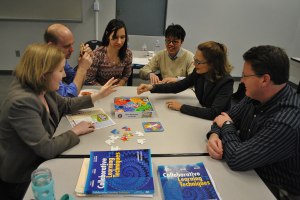Winter 2014 in Louisville has been pretty rough compared to recent years; sub-zero temperatures, several inches of snow, and plenty of snow days and delayed schedule days on campus. While in Canada, we accumulated more snow in 24 hours (the 72nd consecutive day of snowfall in Quebec) than we had in Louisville this winter! Walking track to track on dynamic day usually meant sinking into waist deep snow at least once or twice and the tracks were not marked with cones but were just carved out of the snow that had accumulated over the past 72 days. Travelling from Montreal to Quebec City was interesting as we were the only team to attend that did not own a set of snow tires for their truck. We were clearly “Out of Our Element.”
Monthly Archives: March 2014
Faculty Learning Community on Collaboration

The FLC is exploring ways to bring evidence-based collaborative learning techniques to engineering classrooms
A group of 7 faculty members from Speed are participating in a Faculty Learning Community (FLC) on Collaboration that is sponsored by the Speed School Center for Teaching and Learning Engineering. Drs. Marie Brown (Delphi Center) and Patricia Ralston (Engineering Fundamentals) are facilitators. The FLC is exploring ways to bring evidence-based collaborative learning techniques to engineering classrooms. By properly structuring learning tasks to implement collaborative learning effectively, faculty help students learn the benefits of working together to improve both individual and collective achievement.
Faculty played a spirited game of HiHo CherryO to prepare for their session. They played the collaborative version where the goal is for the group to pick the cherries from the trees rather than compete against teammates.
Show me the money $$
I often get questions about salary data from our students and parents as well. Salary is a very important consideration when reviewing job offers. But I would also caution that there are other portions of the job offer that are very important as well.
When looking at a job offer you should consider (at the least):
- Salary
- Benefits
- Bonuses
- Perks
- Start Date
Salary: You might have an offer in Seattle, Chicago, and Richmond, KY. If the amount is the same, you have very different offers. The cost of living in big cities is much higher than smaller cities and much higher on the coasts than in the Midwest. You can easier Google Cost of Living Calculators to compare the cost of living in different cities.
Benefits: Health Benefits are a HUGE consideration these days. Look not only at the cost of the coverage but also the coverage itself: co-pays, deductibles, dental and vision plans. I once had a friend that accepted a new job with a 30% increase in pay, but he actually took a monthly loss because the health benefits were so costly. Retirement is another VERY important factor. Look for a company match on a 401K, then put it whatever extra you can – believe in the power of interest! Vacation time is another benefit that new grads like to consider. Most companies will have a standard level of vacation but when comparing two offers, an extra week the first year will seem important when you suddenly realize that you lose your spring and fall breaks!!
Bonuses: Bonuses can have an substantial impact on your take home pay – stock options are more of a long term bonus. But company bonuses can triple your salary or offer a nice bump at the end of the year – depending on the terms. These are not very common but they do exist. I see a few students each year with bonuses. Most common are sign-on bonuses.
Perks: These are helpful as well: a company car, parking, health club memberships, or childcare are wonderful money savers.
Start Date: Some employers have group training established every June for new hires, other companies offer individual training, with this is mind, you might have some negotiation room with your start date.
If you are considering an offer – Engineering Career Center staff can assist you with terminology and considerations.
Starting salaries in 2013 for UofL Engineering graduates:
| MASTER OF ENGINEERING DEGREE | ||||||
| Major | Average Offer | Louisville Area Average Offer | High Offer | Low Offer | ||
| Chemical | $60,143 | (7) | $55,750 | (4) | $70,000 | $42,000 |
| Civil & Environmental | $46,862 | (12) | $47,355 | (8) | $55,000 | $40,000 |
| Electrical | $63,761 | (23) | $59,318 | (11) | $78,000 | $47,000 |
| Computer Engineering & Computer Science | $71,625 | (8) | $63,250 | (4) | $95,000 | $50,000 |
| Industrial | $66,667 | (3) | (0) | $71,000 | $60,000 | |
| Mechanical | $56,982 | (24) | $53,500 | (10) | $93,000 | $45,000 |
| BioEngineering | $56,750 | (4) | (0) | $68,000 | $45,000 | |
| OVERALL | $59,474 | (81) | $55,198 | (37) | $95,000 | $40,000 |
Online Learning Improvement Plan
On Friday, February 28, Speed School Dean Neville Pinto sent the following message to engineering faculty and staff. It connects the school’s strategic plan with recent course evaluations to create a call for action to improve the design, development, delivery and assessment of Speed’s online courses and programs. We welcome your feedback and invite you to share your experiences with online learning, suggestions for improvement and ideas for potential new programs. Please contact me directly at todd.reale@louisville.edu or 502-852-5012.
A core element of the Speed School’s mission is to serve our university, community and profession by providing high quality engineering education programs. To realize our vision of becoming the preeminent provider of high quality, accessible and experiential-based engineering education, we must strive for excellence in all that we do. This includes not only attracting a greater diversity of motivated, prepared and talented students into all degree programs, but also engaging students with state-of-the-art engineering curricula and enhanced modes of delivery in our classrooms, labs and online.
We have analyzed course evaluations from 19,793 students enrolled in 1,604 sections of 363 courses taught by 177 instructors in eight departments from Fall 2011 through Fall 2013. While there are many reasons to celebrate and be proud of our departmental and individual accomplishments in both face-to-face and virtual settings, we must strive to close the gap between the two. In general, online courses are not as highly rated by students, particularly in the areas of instructor preparedness, content delivery, course format, use of illustrative examples and overall effectiveness. Students have also reported concerns about the quality and variety of course materials, appropriate use of learning technologies, communication with instructors and interaction with fellow students, as well as responsiveness to program inquiries and admission applications by prospective students.
Despite these general shortcomings, we know that online courses can be equally effective and successful compared to those delivered in the classroom. In its first semester last fall, our new online engineering management program outperformed the averages for all eight quantitative measures when compared not only to all other Speed online courses, but also to all Speed classroom-based courses. Moving forward, we are working with the university’s Delphi Center for Teaching and Learning to develop and implement plans that will help us improve the quality and consistency of both face-to-face and online courses.
- Preparation: If they have not done so already, faculty planning to teach online courses should participate in specialized Delphi Center training. Those teaching this summer are asked to attend Survivor’s Guide training at the Speed School on four Fridays this spring. Those scheduled for next fall or spring will be asked to complete Delphi U prior to teaching online. Additional details will be communicated directly to faculty through the Office of Academic Affairs later this week.
- Improvement: As part of the above training, current and future online instructors will be educated about Quality Matters, a faculty-centered peer review process that is designed to certify the quality of online and blended courses. The QM Rubric will help us improve course design by assessing 41 clearly defined review standards and providing substantial, constructive and specific comments about course strengths and suggestions for improvement. At least eleven existing Speed online courses will be reviewed over the coming year and all new Speed online courses and instructors will be evaluated after one or two future offerings.
- Development: Delphi Center staff will support us as we continue to develop, improve and expand our online offerings. Among other things, they will assist with faculty development; teaching with technology; instructional design; online program development, marketing, recruiting and student services; and Blackboard and other technology support services. They are a valuable on-campus resource for anyone wishing to improve teaching and learning in their classrooms or online.
- Recognition: Two years ago, U.S. News and World Report started its annual ranking of Best Online Graduate Engineering Programs, which provides another opportunity for us to promote our growing online degree and certificate programs. Although the university decided not to participate while the methodology was still being developed in the first year, the Speed School was listed, but not ranked, in the most recent 2014 survey. Student engagement (30%), faculty credentials and training (25%) and student services and technology (20%) account for most of each school’s ranking. These broad categories include smaller factors, such as the presence of tenured and tenure-track faculty with terminal degrees, online teaching best practices training, certified instructional designers, technological infrastructure, collaborative coursework, required course evaluations and more. The above plans for training and assessment will help us communicate a more favorable message about the quality and value of a Speed School graduate degree or certificate.
In conclusion, there are many benefits to embarking on this plan to improve our online programs, including clearer standards, improved teaching quality, enhanced learning outcomes, expanded online offerings, more student enrollments, increased revenues for the school and academic departments, broader recognition, higher rankings and more. It is my hope that you will join me in adopting, supporting and participating in these new initiatives so that we can accomplish our goals, fulfill our mission and realize our vision together.

